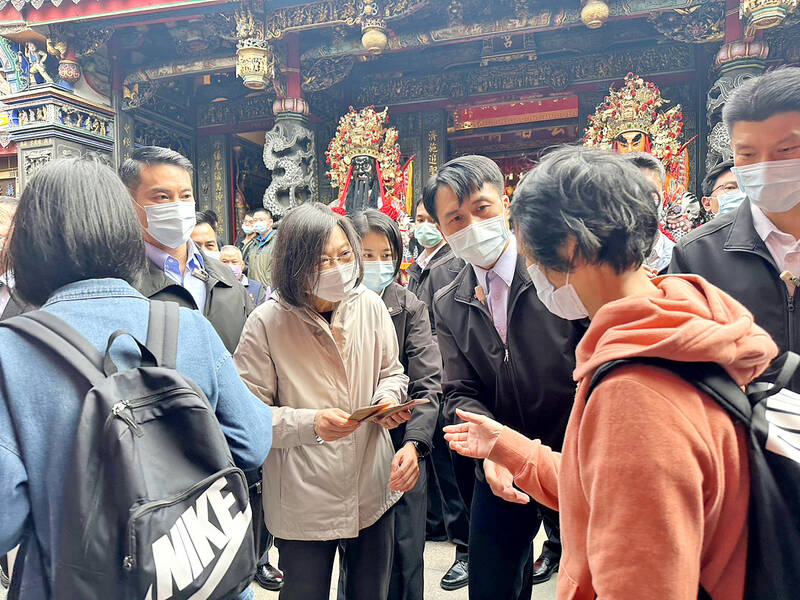The government will prioritize exports of Taiwanese agricultural products to the US market in bilateral talks on the implementation of the US-Taiwan Initiative on 21st-Century Trade, President Tsai Ing-wen (蔡英文) said yesterday.
Tsai made the remarks during a visit to the Dasian Temple (大賢 宮) in Nantou County’s Mingjian Township (名間) on the second day of the Lunar New Year, where she offered prayers for the new year and handed out red envelopes.
Tsai said the government would aim to “systematically improve rural infrastructure, especially water conservation and irrigation systems, so that farmers can grow better crops more easily.”

Photo: CNA
The government is also looking at ways to help small and medium-sized enterprises reduce labor costs through the use of smart technology, she said.
The most important task now for Taiwan is to expand trade in the international agricultural market, she said, adding that the government sees the trade initiative as a way for Taiwan to trade top-quality agricultural products with the US.
“This is a priority project for us. We hope to market good agricultural products to the world, at good prices,” she said.
Taiwan and the US last week wrapped up their latest round of talks in Taipei under the trade initiative, which was launched in June last year.
The Office of Trade Negotiations has said it aims to complete talks with Washington in the areas of trade facilitation, combating corruption, small and medium-sized enterprises, good regulatory practices and the domestic regulation of services.
It added that it hoped to announce the results of those talks before the APEC summit is held in the US later this year.
Separately, Vice President William Lai (賴清德), the new chairman of the Democratic Progressive Party, yesterday morning visited New Taipei City’s Guangji Temple (廣濟宮), Wugu Siandi Temple (五穀先帝廟), Jian Temple (濟安宮) and Zhennan Temple (鎮南宮) as part of his nationwide temple visits during the Lunar New Year holiday.
While giving out red envelopes at the temples, Lai said he hoped that in the coming year, companies and the general public would demonstrate wit and prudence in the face of “poor international economic conditions, geopolitical changes and the threat of authoritarianism.”
Additional reporting by CNA

‘TAIWAN-FRIENDLY’: The last time the Web site fact sheet removed the lines on the US not supporting Taiwanese independence was during the Biden administration in 2022 The US Department of State has removed a statement on its Web site that it does not support Taiwanese independence, among changes that the Taiwanese government praised yesterday as supporting Taiwan. The Taiwan-US relations fact sheet, produced by the department’s Bureau of East Asian and Pacific Affairs, previously stated that the US opposes “any unilateral changes to the status quo from either side; we do not support Taiwan independence; and we expect cross-strait differences to be resolved by peaceful means.” In the updated version published on Thursday, the line stating that the US does not support Taiwanese independence had been removed. The updated

‘CORRECT IDENTIFICATION’: Beginning in May, Taiwanese married to Japanese can register their home country as Taiwan in their spouse’s family record, ‘Nikkei Asia’ said The government yesterday thanked Japan for revising rules that would allow Taiwanese nationals married to Japanese citizens to list their home country as “Taiwan” in the official family record database. At present, Taiwanese have to select “China.” Minister of Foreign Affairs Lin Chia-lung (林佳龍) said the new rule, set to be implemented in May, would now “correctly” identify Taiwanese in Japan and help protect their rights, the Ministry of Foreign Affairs said in a statement. The statement was released after Nikkei Asia reported the new policy earlier yesterday. The name and nationality of a non-Japanese person marrying a Japanese national is added to the

AT RISK: The council reiterated that people should seriously consider the necessity of visiting China, after Beijing passed 22 guidelines to punish ‘die-hard’ separatists The Mainland Affairs Council (MAC) has since Jan. 1 last year received 65 petitions regarding Taiwanese who were interrogated or detained in China, MAC Minister Chiu Chui-cheng (邱垂正) said yesterday. Fifty-two either went missing or had their personal freedoms restricted, with some put in criminal detention, while 13 were interrogated and temporarily detained, he said in a radio interview. On June 21 last year, China announced 22 guidelines to punish “die-hard Taiwanese independence separatists,” allowing Chinese courts to try people in absentia. The guidelines are uncivilized and inhumane, allowing Beijing to seize assets and issue the death penalty, with no regard for potential

‘UNITED FRONT’ FRONTS: Barring contact with Huaqiao and Jinan universities is needed to stop China targeting Taiwanese students, the education minister said Taiwan has blacklisted two Chinese universities from conducting academic exchange programs in the nation after reports that the institutes are arms of Beijing’s United Front Work Department, Minister of Education Cheng Ying-yao (鄭英耀) said in an exclusive interview with the Chinese-language Liberty Times (the Taipei Times’ sister paper) published yesterday. China’s Huaqiao University in Xiamen and Quanzhou, as well as Jinan University in Guangzhou, which have 600 and 1,500 Taiwanese on their rolls respectively, are under direct control of the Chinese government’s political warfare branch, Cheng said, citing reports by national security officials. A comprehensive ban on Taiwanese institutions collaborating or